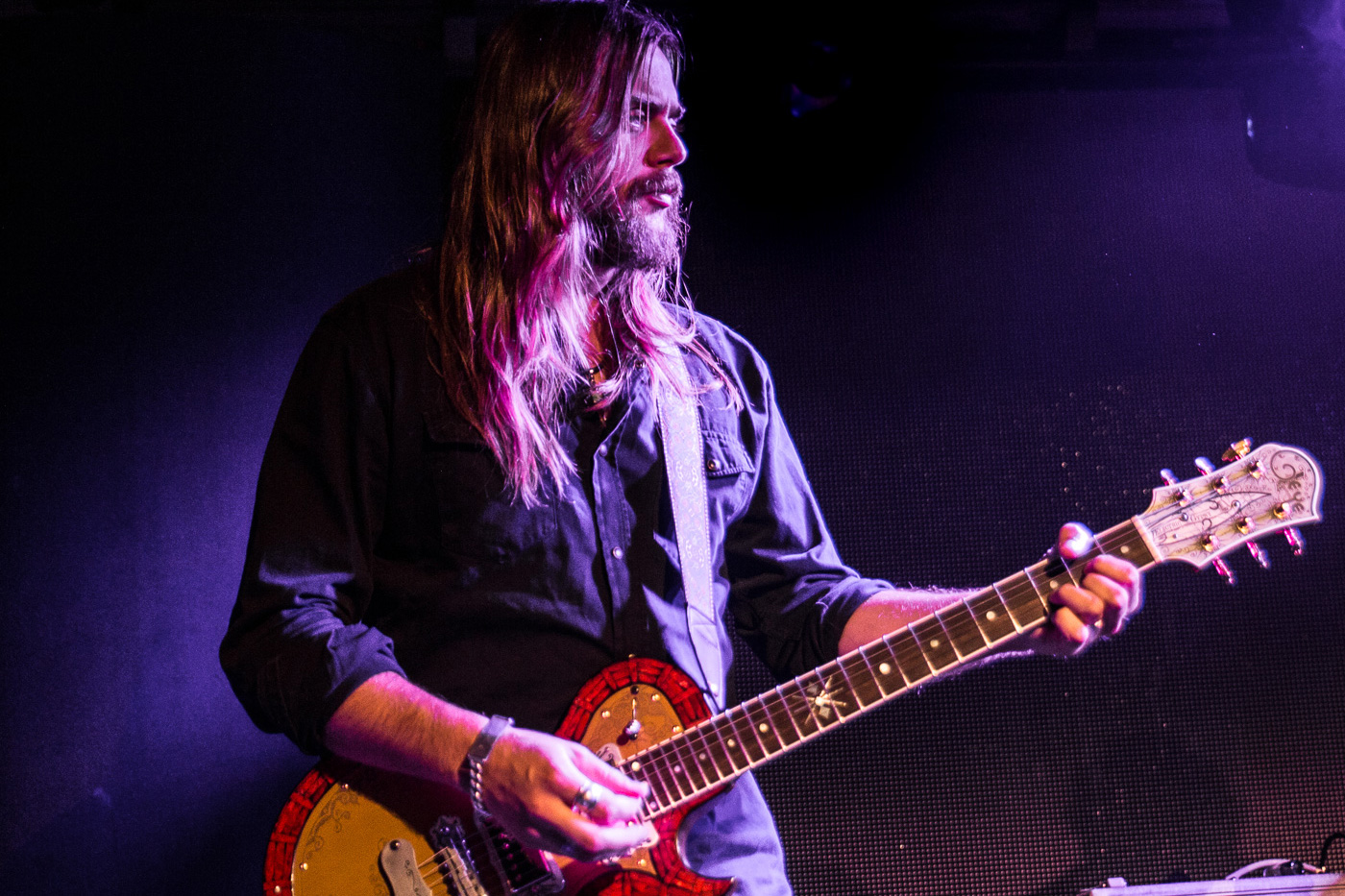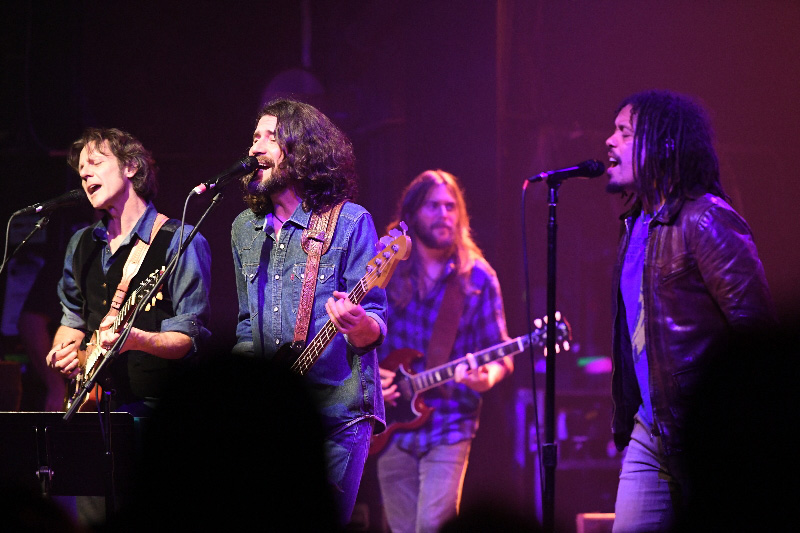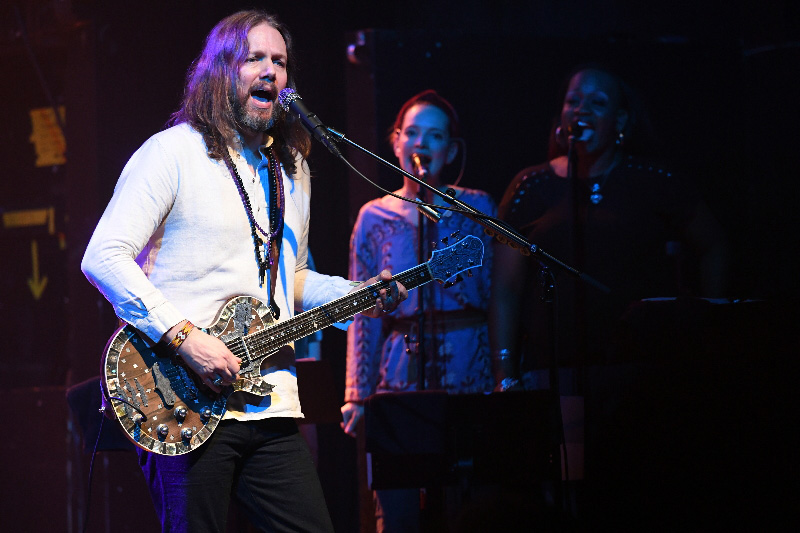“It’s important to show and elicit true and authentic feelings with your music.”
Just because you’re no longer in a group that made many songs you wrote and performed famous is no reason to not continue performing them on your own. Rich Robinson, founding guitarist of the legendary, now-in-limbo jam band The Black Crowes, recognized this not long after he embarked on a solo career in earnest — and then he decided to take it one step further.
“I thought about when we toured with The Dead after Jerry [Garcia] had died. They called it Furthur, with Bob Weir and all these people going out and playing all those Grateful Dead songs,” Robinson recounted to Digital Trends. “And then I thought about Dead & Company, and how they did it. Then I thought about us playing with Jimmy Page, bringing what we could to Led Zeppelin and the guy who wrote all of those songs.”
The next logical step in Robinson’s mind was to get a full band together, and so a new outfit he cleverly dubbed The Magpie Salute was born. Robinson enlisted some of his former Crowes brethren to keep the material he lived and breathed for years alive and kicking — namely, guitarist Marc Ford, keyboardist Eddie Harsch, and bassist Sven Pipien.
“The first guy I called was Marc and next was Ed, and they were both in,” Robinson confirmed. “The more I play and the more I do this, I realize what a gift it is to have this relationship and musical interaction with those people — people who you admire — and what they bring to your music.”
The Magpies began rehearsing in the Woodstock, N.Y., area at Applehead Recording, eventually playing in front of live audiences similar to the way Levon Helm, the late singer and drummer for The Band, did for years with his Midnight Rambles. That led to the recording of the almost totally live, self-titled The Magpie Salute , out today in various formats via Eagle Rock. (Sadly, Harsch passed away in November, though he did get to play with the Magpie collective live, and he does appear on the final album.)
Right out of the gate, with the lone studio track, Omission, The Magpie Salute grooves along like the best jam masters. The album creates a vibe akin to the kind that’s inherent on The Allman Brothers Band’s At Fillmore East, the studio-jam outtakes on Derek & the Dominos’ The Layla Sessions, and the extended improv instrumentals on George Harrison’s All Things Must Pass, which are better known collectively as Apple Jam.
“It was profound, moving, and positive with all of us getting together like that,” Robinson marveled. “That’s when I began thinking, ‘How can we make this keep happening? How can we do this even more?’”
The answer: Head back out on the road and take The Magpie Salute directly to the people who got them there in the first place. Digital Trends spoke with Robinson before the tour took full flight to discuss the definition of “real” music, why vinyl garners respect, and the ongoing value of the live experience.
Digital Trends: Do you feel like what you guys are creating with The Magpie Salute carries on the mantle of a certain style of music you grew up playing and now want to share with a newer generation of listeners?
Rich Robinson: Look, good music is good music. I used to look at the footage of Woody Guthrie walking around with “This Machine Kills Fascists” on his guitar, and there seems to be this portion of the world who are now waking up to what’s considered “real” music.
Ultimately, I think what we do is real music people can touch on and relate to, and it’s more important now than ever. It’s important to show and elicit true and authentic feelings in music. And right now, pop music is at its worst. It’s worse than it’s ever been. People think technology is what you need to push music forward, but that’s bullshit. What these pop records sound like now is like video games.
I don’t think technology should replace feeling. It should be utilized to enhance the music. For example, you use two amplifiers to get a thicker delay sound with your guitar, and that’s a real thing. Those are real sounds.
Running your vocals through AutoTune is inhuman. Everyone sings a little bit flat, and a little bit sharp.
Thanks. It’s real music made by real people, warts and all. It’s human to speed up a little bit, or slow down a little bit. Quantizing everything is not human. And running your vocals through AutoTune is inhuman. Everyone sings a little bit flat, and a little bit sharp.
It never bothered anyone when Robert Plant [of Led Zeppelin] sang that way — or Steve Marriott [of Small Faces and Humble Pie], or Mick Jagger [of The Rolling Stones], Rod Stewart, or any of those guys. Everyone sang around a relative key; it wasn’t done in Pro Tools. That sounds unnatural, because it’s not what our bodies are used to.
To your ear, what are the most “real” records or artists, past or present?
The thing is, you can talk about being retro and “only” liking music from the ’60s and the ’70s, but at least it was pure. But there are bands doing that now too, like Wilco, and some underground bands from New York. I like those Grizzly Bear records, and Durand Jones & The Indications are just great. These are people making really great music.
What’s the best way to listen to Magpie music? Are you still a fan of vinyl? Is that still important to you?
Well, vinyl is more of a process. It’s not convenient, but people seem to have more respect for it. People who listen to vinyl actually take the time to go to the store and buy it, or go online and order it. Still, you have to unwrap it, walk over to the turntable, lift the needle, and put the thing down on it. There’s a tactile response to it, and then you listen to it.
It can be glorious — and you have to listen vigilantly, because it doesn’t last very long. You have to get up and change it.
Right, you have to interact with it. It’s not a passive experience.
You do have to interact with it, yeah. We have a lot more respect for something we have to work for.
I’m down with you on that. I also think it helps forge a deeper relationship with the music itself.
And hopefully, we’ll keep going down that road. I read this article about people who buy music on Apple Music, and they think they own it. But if somehow there’s a problem, they could just shut all your stuff off. They could just flip a switch and go, “Nope!” (laughs)
I like owning my music, not just renting it. I have no problem “voting” with my dollars, which is how I like to put it.
I think more and more people are going to start understanding that. There has to be an exchange — or a virtual exchange, when it’s digital — because someone, who’s ultimately not you, owns all this.
If you own a record, you own a record. And you can listen to it anytime you want.
And whether you elect to or not, if someone takes your photos off your phone or your computer and it’s stored in this weird “non-world,” who then owns it if you don’t pay your iCloud bill? Are they gonna cut off your access to all of your photos? Then it becomes a convoluted discussion about what does one own, and what is this digital world really becoming? I think it just clouds everything.
Here’s the thing, man — if you own a record, you own a record. And you can listen to it anytime you want.
True. Once convenience began overtaking the value of the art itself, a lot of things related to that idea went out the window. Having immediate access to all kinds of art — music, film, paintings, whatever — has actually devalued it.
You can see that in the lack of reverence for history. There are those who now think looking at the Mona Lisa on your phone is the same as it would be to stand in front of it in person. But if you flew to Europe or to Paris, and you went to those museums and witnessed these specific, amazing works of art in person, there was a journey that took you there. It wasn’t like taking a boat across the ocean for months and having to march to get there (both laugh), but still, there was a process to it. Therefore, you’re gonna respect that more, rather than saying, “Oh, I don’t need to see that in person. I can see that on my phone.” There is some kind of bizarre disconnect there.
It’s a totally different experience. You connect with it in a much different way.
And if you follow that train of thought, because there is so much easy access to these things, then it goes back to why listening to vinyl actually makes sense, because you have a respect for it.
Do you think that’s why the experience of going to see bands perform live is even more vital than ever? Is that the best actual way for everyone to connect now?
It is, and it’s amazing — when it all connects, there’s nothing better. Everyone’s in this building together. I always liken it to a wheel. There’s the hub, which is the music, and then there’s the spokes, which are everyone in there just viewing it, and we’re all coming together for different reasons. There are band members up onstage playing it and people in the audience appreciating it, but we’re all part of the wheel. We’re all there for this one hub that makes this whole thing work.
I believe when people show up and watch this band, they follow this music and feed off the band, and the band feeds off the people. And when people get bored and check their fucking Facebook or are trying to film it, it becomes more about taking, instead of experiencing.
But there is this amazing element there. You can go sit in this audience and be there, and it’s really about being present. Or I’ve seen it sometimes where someone will go, “Oh, so-and-so got a haircut.” What are these people looking at? Are they so disinterested that they only want to hear the chorus of the song they like? They can’t open their minds up to something greater?
They’re missing out. They’d rather take this experience home and share it with other people, and have everyone in their circle view this on some shitty little phone with bad speakers and a little screen, instead of being in the moment.
You wrote or co-wrote a lot of that iconic Black Crowes material. Do you feel you’re now able to take songs from that canon and turn them into different live animals, now that you’re 15 to 20 years beyond when you first recorded them?
Yeah. All of us have these years of experience and what we’ve all gone though in our lives, and how music has been with us all our lives — but it shifts. You’re young and arrogant and happy, and then you go through these trials and you have kids and start a family, and some people get divorced, and some people have extra stress.
And obviously, we’re bringing in all of that experience, let alone the fact that we’ve come to having played music for 20 or 25 years — or longer — and we’ve brought that element to what we’re doing, so I think it really does speak to that. What’s constant with your perspective of the music, and how that works within and without, is what’s really interesting.






